Impact of Covid-19 on Tourism and Business in UK
VerifiedAdded on 2023/06/14
|6
|2168
|312
AI Summary
Covid-19 pandemic had a severe impact on the tourism industry in UK, which contributed 6.7% to the country's GDP in 2018. The lockdowns imposed in 2020 led to a major loss in the tourism sector, with hotels seeing the largest fall in room occupancy rate. The unnecessary travel was restricted, leading to a decrease in demand for tour and travel. The pandemic affected the industry both directly and indirectly, reducing its contribution to the UK economy from £106 billion to £48 billion. The essay explains the importance of the tourism sector on the UK economy, ways in which the pandemic affected the industry, and the measures taken to overcome the crisis.
Contribute Materials
Your contribution can guide someone’s learning journey. Share your
documents today.
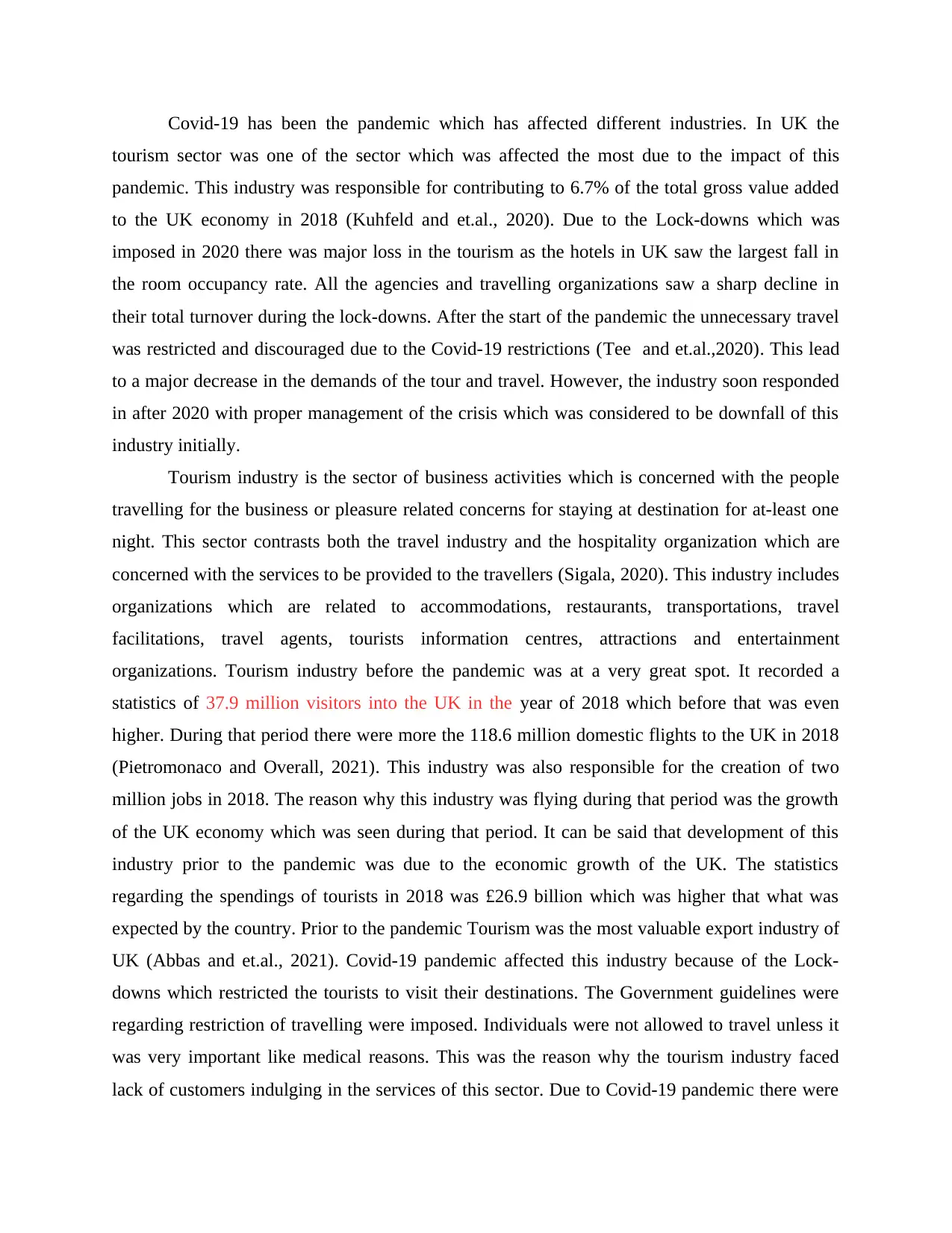
Covid-19 has been the pandemic which has affected different industries. In UK the
tourism sector was one of the sector which was affected the most due to the impact of this
pandemic. This industry was responsible for contributing to 6.7% of the total gross value added
to the UK economy in 2018 (Kuhfeld and et.al., 2020). Due to the Lock-downs which was
imposed in 2020 there was major loss in the tourism as the hotels in UK saw the largest fall in
the room occupancy rate. All the agencies and travelling organizations saw a sharp decline in
their total turnover during the lock-downs. After the start of the pandemic the unnecessary travel
was restricted and discouraged due to the Covid-19 restrictions (Tee and et.al.,2020). This lead
to a major decrease in the demands of the tour and travel. However, the industry soon responded
in after 2020 with proper management of the crisis which was considered to be downfall of this
industry initially.
Tourism industry is the sector of business activities which is concerned with the people
travelling for the business or pleasure related concerns for staying at destination for at-least one
night. This sector contrasts both the travel industry and the hospitality organization which are
concerned with the services to be provided to the travellers (Sigala, 2020). This industry includes
organizations which are related to accommodations, restaurants, transportations, travel
facilitations, travel agents, tourists information centres, attractions and entertainment
organizations. Tourism industry before the pandemic was at a very great spot. It recorded a
statistics of 37.9 million visitors into the UK in the year of 2018 which before that was even
higher. During that period there were more the 118.6 million domestic flights to the UK in 2018
(Pietromonaco and Overall, 2021). This industry was also responsible for the creation of two
million jobs in 2018. The reason why this industry was flying during that period was the growth
of the UK economy which was seen during that period. It can be said that development of this
industry prior to the pandemic was due to the economic growth of the UK. The statistics
regarding the spendings of tourists in 2018 was £26.9 billion which was higher that what was
expected by the country. Prior to the pandemic Tourism was the most valuable export industry of
UK (Abbas and et.al., 2021). Covid-19 pandemic affected this industry because of the Lock-
downs which restricted the tourists to visit their destinations. The Government guidelines were
regarding restriction of travelling were imposed. Individuals were not allowed to travel unless it
was very important like medical reasons. This was the reason why the tourism industry faced
lack of customers indulging in the services of this sector. Due to Covid-19 pandemic there were
tourism sector was one of the sector which was affected the most due to the impact of this
pandemic. This industry was responsible for contributing to 6.7% of the total gross value added
to the UK economy in 2018 (Kuhfeld and et.al., 2020). Due to the Lock-downs which was
imposed in 2020 there was major loss in the tourism as the hotels in UK saw the largest fall in
the room occupancy rate. All the agencies and travelling organizations saw a sharp decline in
their total turnover during the lock-downs. After the start of the pandemic the unnecessary travel
was restricted and discouraged due to the Covid-19 restrictions (Tee and et.al.,2020). This lead
to a major decrease in the demands of the tour and travel. However, the industry soon responded
in after 2020 with proper management of the crisis which was considered to be downfall of this
industry initially.
Tourism industry is the sector of business activities which is concerned with the people
travelling for the business or pleasure related concerns for staying at destination for at-least one
night. This sector contrasts both the travel industry and the hospitality organization which are
concerned with the services to be provided to the travellers (Sigala, 2020). This industry includes
organizations which are related to accommodations, restaurants, transportations, travel
facilitations, travel agents, tourists information centres, attractions and entertainment
organizations. Tourism industry before the pandemic was at a very great spot. It recorded a
statistics of 37.9 million visitors into the UK in the year of 2018 which before that was even
higher. During that period there were more the 118.6 million domestic flights to the UK in 2018
(Pietromonaco and Overall, 2021). This industry was also responsible for the creation of two
million jobs in 2018. The reason why this industry was flying during that period was the growth
of the UK economy which was seen during that period. It can be said that development of this
industry prior to the pandemic was due to the economic growth of the UK. The statistics
regarding the spendings of tourists in 2018 was £26.9 billion which was higher that what was
expected by the country. Prior to the pandemic Tourism was the most valuable export industry of
UK (Abbas and et.al., 2021). Covid-19 pandemic affected this industry because of the Lock-
downs which restricted the tourists to visit their destinations. The Government guidelines were
regarding restriction of travelling were imposed. Individuals were not allowed to travel unless it
was very important like medical reasons. This was the reason why the tourism industry faced
lack of customers indulging in the services of this sector. Due to Covid-19 pandemic there were
Secure Best Marks with AI Grader
Need help grading? Try our AI Grader for instant feedback on your assignments.
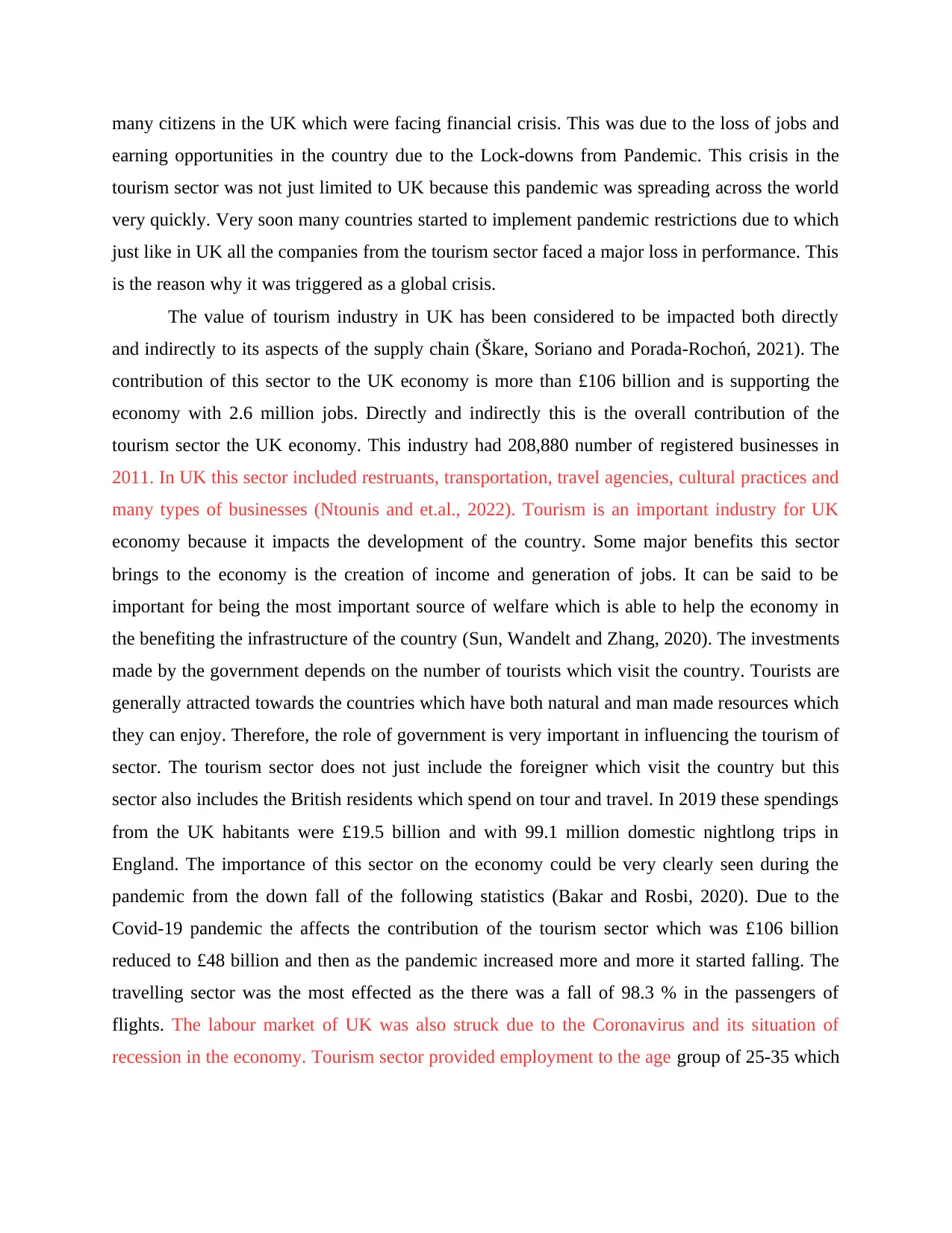
many citizens in the UK which were facing financial crisis. This was due to the loss of jobs and
earning opportunities in the country due to the Lock-downs from Pandemic. This crisis in the
tourism sector was not just limited to UK because this pandemic was spreading across the world
very quickly. Very soon many countries started to implement pandemic restrictions due to which
just like in UK all the companies from the tourism sector faced a major loss in performance. This
is the reason why it was triggered as a global crisis.
The value of tourism industry in UK has been considered to be impacted both directly
and indirectly to its aspects of the supply chain (Škare, Soriano and Porada-Rochoń, 2021). The
contribution of this sector to the UK economy is more than £106 billion and is supporting the
economy with 2.6 million jobs. Directly and indirectly this is the overall contribution of the
tourism sector the UK economy. This industry had 208,880 number of registered businesses in
2011. In UK this sector included restruants, transportation, travel agencies, cultural practices and
many types of businesses (Ntounis and et.al., 2022). Tourism is an important industry for UK
economy because it impacts the development of the country. Some major benefits this sector
brings to the economy is the creation of income and generation of jobs. It can be said to be
important for being the most important source of welfare which is able to help the economy in
the benefiting the infrastructure of the country (Sun, Wandelt and Zhang, 2020). The investments
made by the government depends on the number of tourists which visit the country. Tourists are
generally attracted towards the countries which have both natural and man made resources which
they can enjoy. Therefore, the role of government is very important in influencing the tourism of
sector. The tourism sector does not just include the foreigner which visit the country but this
sector also includes the British residents which spend on tour and travel. In 2019 these spendings
from the UK habitants were £19.5 billion and with 99.1 million domestic nightlong trips in
England. The importance of this sector on the economy could be very clearly seen during the
pandemic from the down fall of the following statistics (Bakar and Rosbi, 2020). Due to the
Covid-19 pandemic the affects the contribution of the tourism sector which was £106 billion
reduced to £48 billion and then as the pandemic increased more and more it started falling. The
travelling sector was the most effected as the there was a fall of 98.3 % in the passengers of
flights. The labour market of UK was also struck due to the Coronavirus and its situation of
recession in the economy. Tourism sector provided employment to the age group of 25-35 which
earning opportunities in the country due to the Lock-downs from Pandemic. This crisis in the
tourism sector was not just limited to UK because this pandemic was spreading across the world
very quickly. Very soon many countries started to implement pandemic restrictions due to which
just like in UK all the companies from the tourism sector faced a major loss in performance. This
is the reason why it was triggered as a global crisis.
The value of tourism industry in UK has been considered to be impacted both directly
and indirectly to its aspects of the supply chain (Škare, Soriano and Porada-Rochoń, 2021). The
contribution of this sector to the UK economy is more than £106 billion and is supporting the
economy with 2.6 million jobs. Directly and indirectly this is the overall contribution of the
tourism sector the UK economy. This industry had 208,880 number of registered businesses in
2011. In UK this sector included restruants, transportation, travel agencies, cultural practices and
many types of businesses (Ntounis and et.al., 2022). Tourism is an important industry for UK
economy because it impacts the development of the country. Some major benefits this sector
brings to the economy is the creation of income and generation of jobs. It can be said to be
important for being the most important source of welfare which is able to help the economy in
the benefiting the infrastructure of the country (Sun, Wandelt and Zhang, 2020). The investments
made by the government depends on the number of tourists which visit the country. Tourists are
generally attracted towards the countries which have both natural and man made resources which
they can enjoy. Therefore, the role of government is very important in influencing the tourism of
sector. The tourism sector does not just include the foreigner which visit the country but this
sector also includes the British residents which spend on tour and travel. In 2019 these spendings
from the UK habitants were £19.5 billion and with 99.1 million domestic nightlong trips in
England. The importance of this sector on the economy could be very clearly seen during the
pandemic from the down fall of the following statistics (Bakar and Rosbi, 2020). Due to the
Covid-19 pandemic the affects the contribution of the tourism sector which was £106 billion
reduced to £48 billion and then as the pandemic increased more and more it started falling. The
travelling sector was the most effected as the there was a fall of 98.3 % in the passengers of
flights. The labour market of UK was also struck due to the Coronavirus and its situation of
recession in the economy. Tourism sector provided employment to the age group of 25-35 which
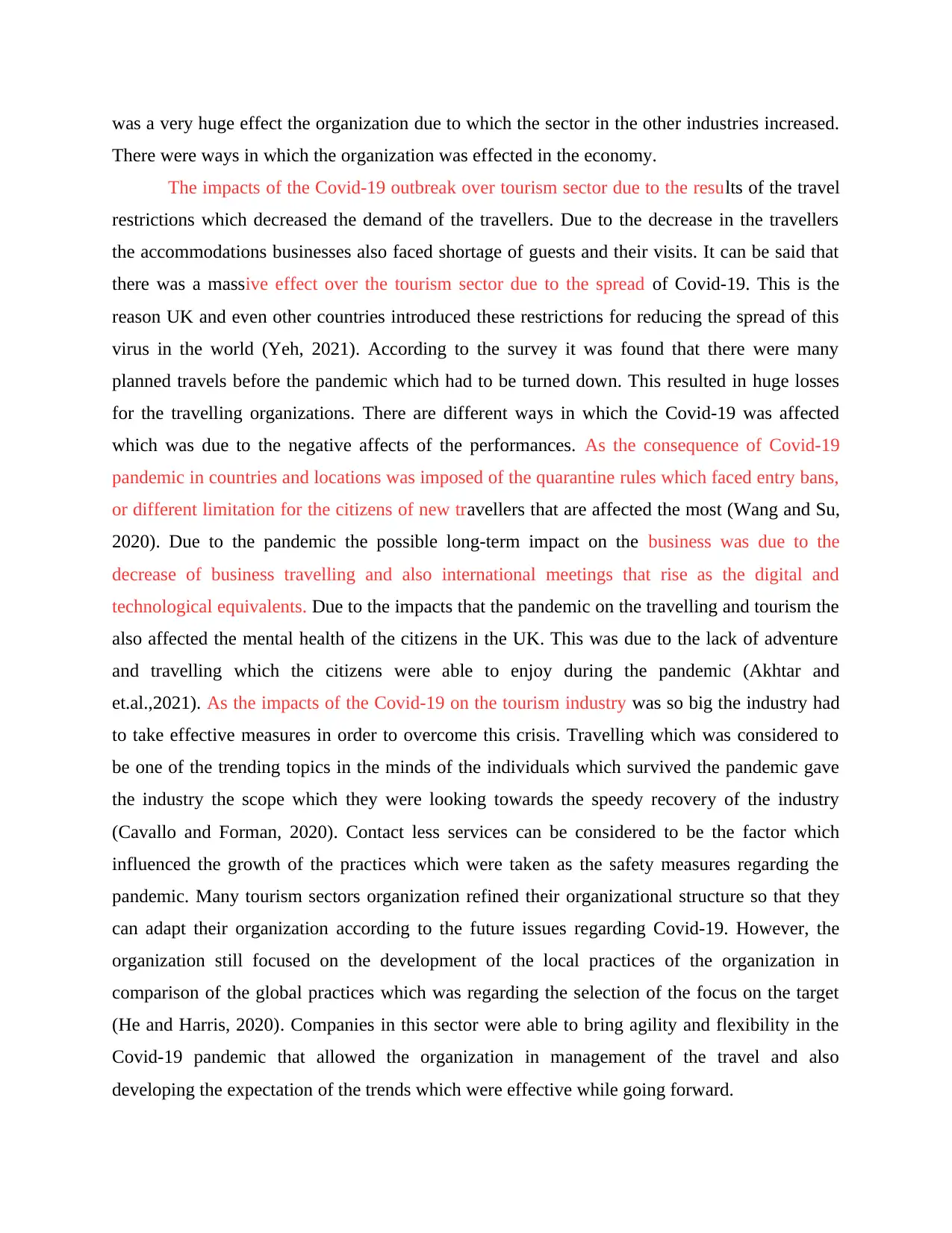
was a very huge effect the organization due to which the sector in the other industries increased.
There were ways in which the organization was effected in the economy.
The impacts of the Covid-19 outbreak over tourism sector due to the results of the travel
restrictions which decreased the demand of the travellers. Due to the decrease in the travellers
the accommodations businesses also faced shortage of guests and their visits. It can be said that
there was a massive effect over the tourism sector due to the spread of Covid-19. This is the
reason UK and even other countries introduced these restrictions for reducing the spread of this
virus in the world (Yeh, 2021). According to the survey it was found that there were many
planned travels before the pandemic which had to be turned down. This resulted in huge losses
for the travelling organizations. There are different ways in which the Covid-19 was affected
which was due to the negative affects of the performances. As the consequence of Covid-19
pandemic in countries and locations was imposed of the quarantine rules which faced entry bans,
or different limitation for the citizens of new travellers that are affected the most (Wang and Su,
2020). Due to the pandemic the possible long-term impact on the business was due to the
decrease of business travelling and also international meetings that rise as the digital and
technological equivalents. Due to the impacts that the pandemic on the travelling and tourism the
also affected the mental health of the citizens in the UK. This was due to the lack of adventure
and travelling which the citizens were able to enjoy during the pandemic (Akhtar and
et.al.,2021). As the impacts of the Covid-19 on the tourism industry was so big the industry had
to take effective measures in order to overcome this crisis. Travelling which was considered to
be one of the trending topics in the minds of the individuals which survived the pandemic gave
the industry the scope which they were looking towards the speedy recovery of the industry
(Cavallo and Forman, 2020). Contact less services can be considered to be the factor which
influenced the growth of the practices which were taken as the safety measures regarding the
pandemic. Many tourism sectors organization refined their organizational structure so that they
can adapt their organization according to the future issues regarding Covid-19. However, the
organization still focused on the development of the local practices of the organization in
comparison of the global practices which was regarding the selection of the focus on the target
(He and Harris, 2020). Companies in this sector were able to bring agility and flexibility in the
Covid-19 pandemic that allowed the organization in management of the travel and also
developing the expectation of the trends which were effective while going forward.
There were ways in which the organization was effected in the economy.
The impacts of the Covid-19 outbreak over tourism sector due to the results of the travel
restrictions which decreased the demand of the travellers. Due to the decrease in the travellers
the accommodations businesses also faced shortage of guests and their visits. It can be said that
there was a massive effect over the tourism sector due to the spread of Covid-19. This is the
reason UK and even other countries introduced these restrictions for reducing the spread of this
virus in the world (Yeh, 2021). According to the survey it was found that there were many
planned travels before the pandemic which had to be turned down. This resulted in huge losses
for the travelling organizations. There are different ways in which the Covid-19 was affected
which was due to the negative affects of the performances. As the consequence of Covid-19
pandemic in countries and locations was imposed of the quarantine rules which faced entry bans,
or different limitation for the citizens of new travellers that are affected the most (Wang and Su,
2020). Due to the pandemic the possible long-term impact on the business was due to the
decrease of business travelling and also international meetings that rise as the digital and
technological equivalents. Due to the impacts that the pandemic on the travelling and tourism the
also affected the mental health of the citizens in the UK. This was due to the lack of adventure
and travelling which the citizens were able to enjoy during the pandemic (Akhtar and
et.al.,2021). As the impacts of the Covid-19 on the tourism industry was so big the industry had
to take effective measures in order to overcome this crisis. Travelling which was considered to
be one of the trending topics in the minds of the individuals which survived the pandemic gave
the industry the scope which they were looking towards the speedy recovery of the industry
(Cavallo and Forman, 2020). Contact less services can be considered to be the factor which
influenced the growth of the practices which were taken as the safety measures regarding the
pandemic. Many tourism sectors organization refined their organizational structure so that they
can adapt their organization according to the future issues regarding Covid-19. However, the
organization still focused on the development of the local practices of the organization in
comparison of the global practices which was regarding the selection of the focus on the target
(He and Harris, 2020). Companies in this sector were able to bring agility and flexibility in the
Covid-19 pandemic that allowed the organization in management of the travel and also
developing the expectation of the trends which were effective while going forward.
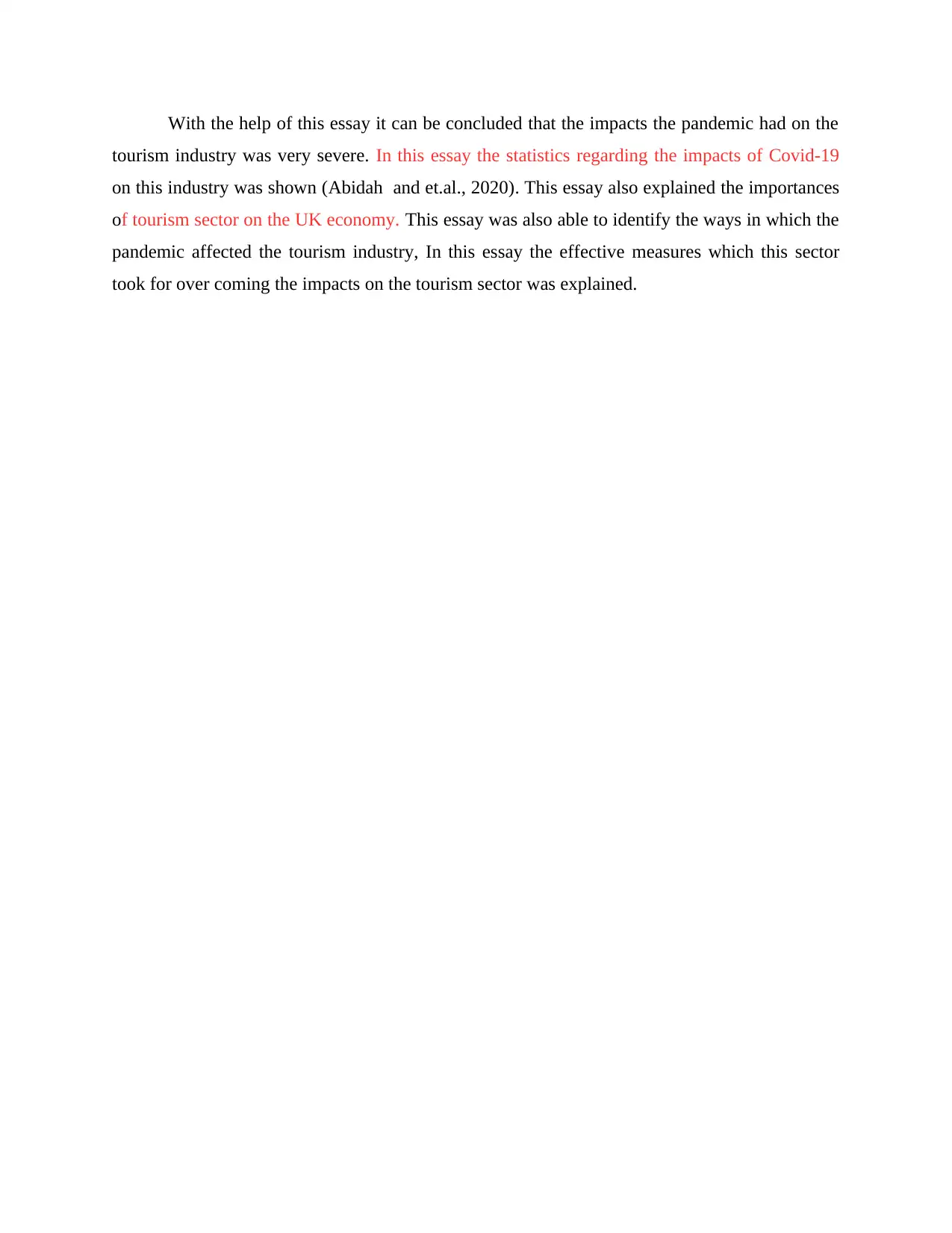
With the help of this essay it can be concluded that the impacts the pandemic had on the
tourism industry was very severe. In this essay the statistics regarding the impacts of Covid-19
on this industry was shown (Abidah and et.al., 2020). This essay also explained the importances
of tourism sector on the UK economy. This essay was also able to identify the ways in which the
pandemic affected the tourism industry, In this essay the effective measures which this sector
took for over coming the impacts on the tourism sector was explained.
tourism industry was very severe. In this essay the statistics regarding the impacts of Covid-19
on this industry was shown (Abidah and et.al., 2020). This essay also explained the importances
of tourism sector on the UK economy. This essay was also able to identify the ways in which the
pandemic affected the tourism industry, In this essay the effective measures which this sector
took for over coming the impacts on the tourism sector was explained.
Secure Best Marks with AI Grader
Need help grading? Try our AI Grader for instant feedback on your assignments.
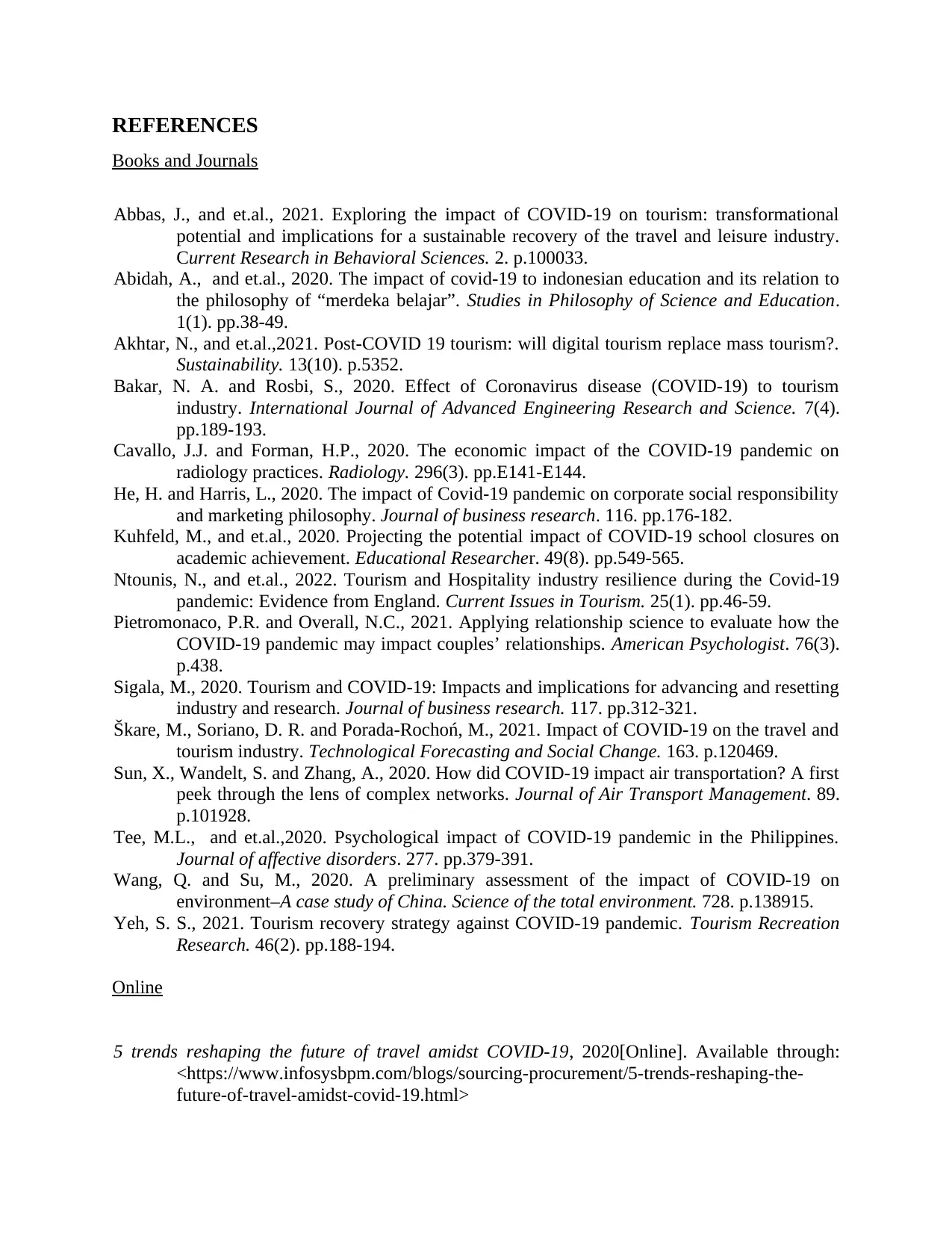
REFERENCES
Books and Journals
Abbas, J., and et.al., 2021. Exploring the impact of COVID-19 on tourism: transformational
potential and implications for a sustainable recovery of the travel and leisure industry.
Current Research in Behavioral Sciences. 2. p.100033.
Abidah, A., and et.al., 2020. The impact of covid-19 to indonesian education and its relation to
the philosophy of “merdeka belajar”. Studies in Philosophy of Science and Education.
1(1). pp.38-49.
Akhtar, N., and et.al.,2021. Post-COVID 19 tourism: will digital tourism replace mass tourism?.
Sustainability. 13(10). p.5352.
Bakar, N. A. and Rosbi, S., 2020. Effect of Coronavirus disease (COVID-19) to tourism
industry. International Journal of Advanced Engineering Research and Science. 7(4).
pp.189-193.
Cavallo, J.J. and Forman, H.P., 2020. The economic impact of the COVID-19 pandemic on
radiology practices. Radiology. 296(3). pp.E141-E144.
He, H. and Harris, L., 2020. The impact of Covid-19 pandemic on corporate social responsibility
and marketing philosophy. Journal of business research. 116. pp.176-182.
Kuhfeld, M., and et.al., 2020. Projecting the potential impact of COVID-19 school closures on
academic achievement. Educational Researcher. 49(8). pp.549-565.
Ntounis, N., and et.al., 2022. Tourism and Hospitality industry resilience during the Covid-19
pandemic: Evidence from England. Current Issues in Tourism. 25(1). pp.46-59.
Pietromonaco, P.R. and Overall, N.C., 2021. Applying relationship science to evaluate how the
COVID-19 pandemic may impact couples’ relationships. American Psychologist. 76(3).
p.438.
Sigala, M., 2020. Tourism and COVID-19: Impacts and implications for advancing and resetting
industry and research. Journal of business research. 117. pp.312-321.
Škare, M., Soriano, D. R. and Porada-Rochoń, M., 2021. Impact of COVID-19 on the travel and
tourism industry. Technological Forecasting and Social Change. 163. p.120469.
Sun, X., Wandelt, S. and Zhang, A., 2020. How did COVID-19 impact air transportation? A first
peek through the lens of complex networks. Journal of Air Transport Management. 89.
p.101928.
Tee, M.L., and et.al.,2020. Psychological impact of COVID-19 pandemic in the Philippines.
Journal of affective disorders. 277. pp.379-391.
Wang, Q. and Su, M., 2020. A preliminary assessment of the impact of COVID-19 on
environment–A case study of China. Science of the total environment. 728. p.138915.
Yeh, S. S., 2021. Tourism recovery strategy against COVID-19 pandemic. Tourism Recreation
Research. 46(2). pp.188-194.
Online
5 trends reshaping the future of travel amidst COVID-19, 2020[Online]. Available through:
<https://www.infosysbpm.com/blogs/sourcing-procurement/5-trends-reshaping-the-
future-of-travel-amidst-covid-19.html>
Books and Journals
Abbas, J., and et.al., 2021. Exploring the impact of COVID-19 on tourism: transformational
potential and implications for a sustainable recovery of the travel and leisure industry.
Current Research in Behavioral Sciences. 2. p.100033.
Abidah, A., and et.al., 2020. The impact of covid-19 to indonesian education and its relation to
the philosophy of “merdeka belajar”. Studies in Philosophy of Science and Education.
1(1). pp.38-49.
Akhtar, N., and et.al.,2021. Post-COVID 19 tourism: will digital tourism replace mass tourism?.
Sustainability. 13(10). p.5352.
Bakar, N. A. and Rosbi, S., 2020. Effect of Coronavirus disease (COVID-19) to tourism
industry. International Journal of Advanced Engineering Research and Science. 7(4).
pp.189-193.
Cavallo, J.J. and Forman, H.P., 2020. The economic impact of the COVID-19 pandemic on
radiology practices. Radiology. 296(3). pp.E141-E144.
He, H. and Harris, L., 2020. The impact of Covid-19 pandemic on corporate social responsibility
and marketing philosophy. Journal of business research. 116. pp.176-182.
Kuhfeld, M., and et.al., 2020. Projecting the potential impact of COVID-19 school closures on
academic achievement. Educational Researcher. 49(8). pp.549-565.
Ntounis, N., and et.al., 2022. Tourism and Hospitality industry resilience during the Covid-19
pandemic: Evidence from England. Current Issues in Tourism. 25(1). pp.46-59.
Pietromonaco, P.R. and Overall, N.C., 2021. Applying relationship science to evaluate how the
COVID-19 pandemic may impact couples’ relationships. American Psychologist. 76(3).
p.438.
Sigala, M., 2020. Tourism and COVID-19: Impacts and implications for advancing and resetting
industry and research. Journal of business research. 117. pp.312-321.
Škare, M., Soriano, D. R. and Porada-Rochoń, M., 2021. Impact of COVID-19 on the travel and
tourism industry. Technological Forecasting and Social Change. 163. p.120469.
Sun, X., Wandelt, S. and Zhang, A., 2020. How did COVID-19 impact air transportation? A first
peek through the lens of complex networks. Journal of Air Transport Management. 89.
p.101928.
Tee, M.L., and et.al.,2020. Psychological impact of COVID-19 pandemic in the Philippines.
Journal of affective disorders. 277. pp.379-391.
Wang, Q. and Su, M., 2020. A preliminary assessment of the impact of COVID-19 on
environment–A case study of China. Science of the total environment. 728. p.138915.
Yeh, S. S., 2021. Tourism recovery strategy against COVID-19 pandemic. Tourism Recreation
Research. 46(2). pp.188-194.
Online
5 trends reshaping the future of travel amidst COVID-19, 2020[Online]. Available through:
<https://www.infosysbpm.com/blogs/sourcing-procurement/5-trends-reshaping-the-
future-of-travel-amidst-covid-19.html>

The impact of COVID-19 on small business outcomes and expectations, 2019[Online]. Available
through: <https://www.pnas.org/content/117/30/17656>
through: <https://www.pnas.org/content/117/30/17656>
1 out of 6
Related Documents
Your All-in-One AI-Powered Toolkit for Academic Success.
+13062052269
info@desklib.com
Available 24*7 on WhatsApp / Email
![[object Object]](/_next/static/media/star-bottom.7253800d.svg)
Unlock your academic potential
© 2024 | Zucol Services PVT LTD | All rights reserved.
